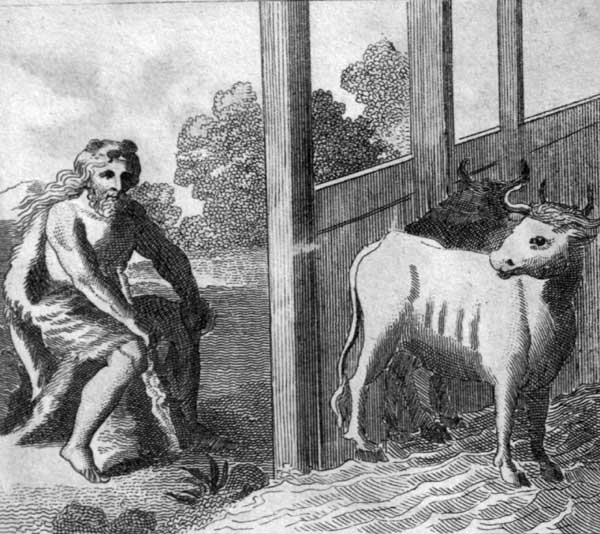The manure of the Augean Stables represents the “fallout” from the first spiritual experiences that the seeker must free himself from.
To fully understand this web page, it is recommended to follow the progression given in the tab Greek myths interpretation. This progression follows the spiritual journey. The method to navigate in the site is given in the Home tab.

Hercules cleaning the Augean stables. 1808.
As fifth labour, Eurystheus ordered Heracles to clean the Augean stables. The king of Elis, Augeas, had several flocks, and the manure accumulated. Heracles, without revealing to the king that he was acting on orders of Eurystheus, negotiated the labour in exchange for wages. Augeas accepted because he thought it was impossible to complete the work on time.
Apollodorus adds several details: the wage consisted of one-tenth of the herd; the hero had to do the cleaning in one day without any help, which he did by opening a hole in the base of the enclosure and diverting the course of the rivers Peneus and Alpheus, cleaning out the manure entirely.
Augeas, having learned that Heracles had to do the work in any case since he was commanded by Eurystheus, refused to give the agreed salary, even denying having ever promised him that. However, he accepted arbitration. Before the judges, his own son Phyleus testified in favour of the hero. Furious, Augeas banished Heracles and Phyleus from the kingdom of Elis.
The hero then went to Olenos, to Dexamenos, who was about to marry his daughter Mnesimache forcefully to the Centaur Eurytion, and killed the latter. Eurystheus refused to recognise this labour, alleging that the hero had performed it for a wage.
After the labours, Heracles returned at the head of an army to avenge the Augean king. (See below the “revenge” of the hero)
The primary sources for this labour are relatively late and its affiliation to the primitive canon of work is often questioned.
With this labour, we leave Arcadia for Elis, a province to which belongs the sanctuary of Olympia and where the final union through liberation must take place (Elis, Λ). This, therefore, refers to the consequences of partial experiences of union with the Real.
Several affiliations are given for the Augean King whose name means “the shining light”. The one that is usually retained is that he would be a son of Helios “the Sun”, making him the symbol of experiences from the supramental plane.
This relationship does not appear, however, in either Homer or Hesiod.
Other sources give him for parents one of the namesakes of Phorbas “he who carries the incarnation” or Poseidon united with Eurycyde “most renowned” daughter of Endymion “devoted and silent consciousness”: the famous “luminous experiences” would then be drawn from the subconscious.
The manure of the Augean flocks accumulated in enclosures represents the residues, due to the ego, of the “luminous experiences”. These can be of all kinds as we stated in the introduction: illumination, contact with the Self, with the Cosmic Divine, outbreaks of light from the supermind, etc.
If the seeker agrees to purify himself, he wants to derive some benefit from his experiences, which is why Heracles negotiates the labour against a wage comprising, according to some, one tenth of the flock. This implies that the seeker has not yet achieved complete detachment. The will, even though it might be subconscious, of wanting to draw “benefits” from the spiritual path lasts a long time in the form of “negotiations” with the Divine. If the soul seems to agree initially so that the purification labour is achieved, it can obviously not pay the “agreed wage”.
To perform this cleaning, Heracles uses the purifying waters of the Alpheus “whiteness” and Peneus “evolution towards equality” through letting go and opening (he made a breach in the enclosure).
It is quite likely that the elders were divided on whether to include this event among the twelve labours. While it is easy to accept the need for purification of egotistical consequences of “experiences”, it does not seem to be a conscious work. In fact, it seems almost impossible to determine what constitutes such “residues” because they work in the “blind spots” of the consciousness.
Among them are probably the repercussions of the first great spiritual experience as told in the quest for the Golden Fleece, the repercussions that the seeker must get rid off to avoid the ordeal of the Minotaur and the labyrinth.
During this time of purification which the seeker knows is unavoidable, he imagines reaping the fruit of some of his experiences without admitting that he must give them up (as Eurystheus ordered him to perform the labours).
When he realises that he shall derive no benefit from it, he is obliged to review the whole process in his consciousness (the judgment). But without waiting for the verdict, the seeker must leave the province of “liberation” for further purification.
If he cannot enjoy the “fruits” of his initial experiences, the hero can still retain something of the nature of that light, as the son of Augeas provides support to the hero and leaves Elis with him (his name Phyleus “tribe” could mean “something of the same kind”).
Apollodorus adds some information concerning this labour to avoid creating more residue. When the cleaning is completed, as the seeker continues with the liberation process (at Olenos “Λ+Ν, the evolution of liberation”) and is in an advanced state of receptivity (in Dexamenos “a receptive soul”), the seeker “who resumes the battle” (Mnesimache) must absolutely realise that he must certainly not work in the manner of the Centaur Eurytion “a superior spirit that is not completely purified (in the vital)”

